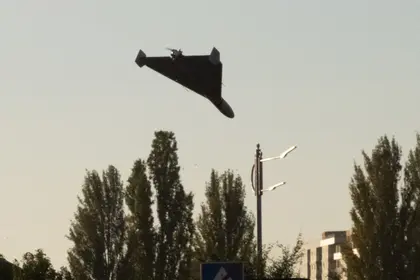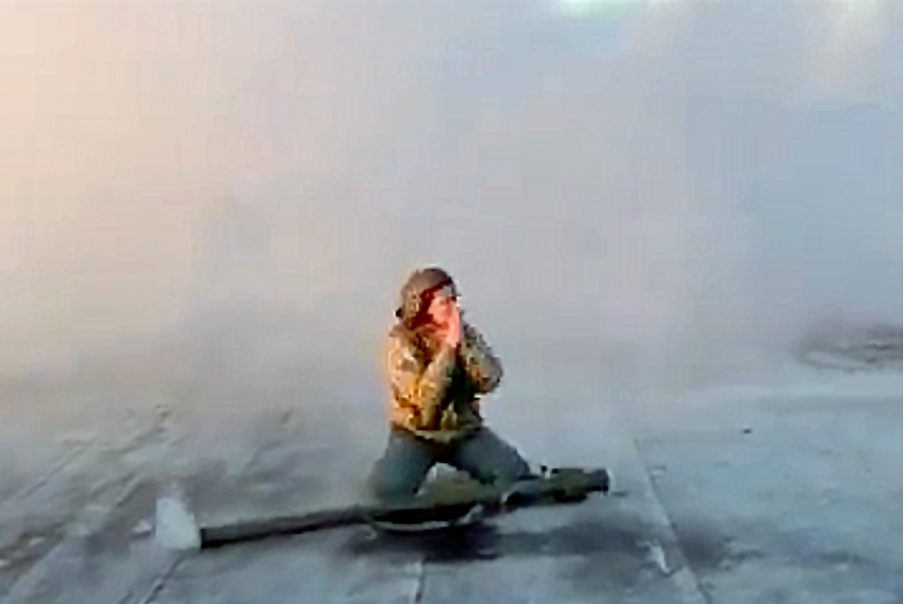Overview:
- AFU chief’s right-hand man killed by grenade in a gift bag, son seriously injured
- Missiles, bombs destroy infrastructure and homes in Kherson and Odesa regions
- Odesa National Art Museum reportedly damaged in strikes
- Russian troops advance east of Kupyansk and south of Bakhmut
- AFU activity by the Dnipro distracting Russians from strategies elsewhere, analysts say
- Russian church demands apology from Alla Pugacheva after return from exile
Bomb in a gift bag kills Hennady Chastiakov, Ukrainian soldier investigated
The Commander-in-Chief of Ukraine’s Armed Forces (AFU) said on Monday via Telegram that one of his top aides was killed by a bomb inside a gift bag. Valery Zaluzhny posted that his close friend Maj. Hennady Chastiakov was surrounded by family on his birthday when an explosive device detonated inside a gift bag.
As seen in a photo published by Ukrainska Pravda, the bag supposedly contained several shot glasses in the shape of grenades, along with a bottle of what looks like brandy or whiskey. The explosion also seriously injured his 13-year-old son, who is being treated at a local hospital.
JOIN US ON TELEGRAM
Follow our coverage of the war on the @Kyivpost_official.
Interior Minister Ihor Klymenko said in a social media post that police have identified the Ukrainian soldier who gave the gift bag to Chastiakov. “At first, the son took the munition in his hands and began to turn the ring. Then [the father] took the grenade away from the child and pulled the ring, causing a tragic explosion,” Klymenko said.
“The police found a fellow soldier who gave him the fatal gift,” Klymenko added on Telegram. “His office was already searched and two similar grenades were seized… I urge you not to spread unofficial information. The pre-trial investigation is ongoing.”
“Unspeakable pain and a heavy loss for the Armed Forces of Ukraine, and for me personally.” Zaluzhny wrote, “Since the beginning of the full-scale invasion, Hennady has been a reliable shoulder for me to lean on, completely devoting his life to the Armed Forces of Ukraine and the fight against Russia’s aggression.”

US Approves Antipersonnel Mines for Ukraine
“Largest yet” attack of Russian glide bombs hit Southern Ukraine, art museum damaged
Interior Minister Ihor Klymenko said on Monday that 87 glide bombs – the largest number to date in the Russian invasion – were launched on Sunday night and Monday morning, hitting targets in civilian areas around Odesa and Kherson region.
The Ukrainian General Staff reported that the Russian strikes targeted port facilities in the Odesa region, civilian homes in the city of Kherson, and damaged transportation infrastructure and other civil infrastructure, according to the Institute for the Study of War (ISW). The head of the Odesa region’s military administration, Oleh Kiper, reported that a Russian strike partially damaged the Odesa National Art Museum.
Ukraine’s Southern Operational Command reported that Russian forces also launched a Kh-59 cruise missile at the city of Dnipro and a Kh-31P anti-radar missile at Odesa on Sunday, adding that air defenses shot down the Kh-59 missile, but that the Kh-31P missile found its target at an infrastructure facility in Odesa.
The Air Force meanwhile reported that Russian forces additionally launched a Kh-31 anti-radar missile and a Kh-59 cruise missile launched from the Kherson region, as well as a P-800 Onyx anti-ship, an Iskander-M ballistic missile, and 22 Shahed-131/136 drones launched from occupied Crimea. The Air Force said that it had destroyed the Kh-59 missile and shot down 15 drones.
Operations: Kharkiv Region
According to ISW reports, Russian troops made confirmed advances on Monday along the Kupyansk-Svatove-Kreminna line. Geolocated footage from Monday shows Russian units advancing southwest of Pershotravneve (24 km east of Kupyansk), while a Russian blogger on the ground claimed that Russian forces also made gains near Stepova Novoselivka (22 km southeast of Kupyansk).
The Ukrainian General Staff reported that Russian troops unsuccessfully attacked near Synkivka (8 km northeast of Kupyansk), Petropavlivka (7 km east of Kupyansk), and Ivanivka (20 km southeast of Kupyansk). The Ukrainian Assistant Head of the 15th “Steel Border” Mobile Border Detachment Ivan Shevtsov reported on Sunday that about 250 former Wagner fighters have arrived in the Kupyansk-Lyman area “to manage assault operations by regular Russian forces and Storm-Z units consisting mostly of convicts,” the ISW reported.
Operations: Donetsk Region
Russian units made some confirmed wins in the Bakhmut area, as footage posted on Monday shows Moscow’s forces making “marginal advances” northward along a road near Vasyukivka (about 12 km north of Bakhmut).
A Ukrainian source and several Russian bloggers also claimed that Russian units made gains near the Berkhivka reservoir (4 km northwest of Bakhmut), with some reports claiming that Russian forces control the whole reservoir, and others claiming that they only control the southern shore.
A Kremlin-affiliated source claimed that Russian troops are successfully pushing Ukrainian forces away from positions between Klishchiivka and Andriivka (about 10 km southwest of Bakhmut). Meanwhile, the General Staff of the AFU claimed that Russian forces unsuccessfully tried to regain lost positions near Klishchiivka and Andriivka and were repelled in several other nearby villages.
Operations: Dnipro River
According to the ISW, Russian sources are saying that Ukraine “may already be fielding the small infantry assault groups” on the left bank of the Dnipro that are successfully diverting Russian resources and manpower from elsewhere. A Russian military blogger said the Russian command has attempted to employ this strategy of small infantry groups, and that lower-level commanders have previously made some progress in this regard south of Bakhmut, but that the high command insists on manpower-intensive frontal assaults, which “quickly rendered these groups combat ineffective.”
Meanwhile, Ukrainian troops appear to be holding their ground along the left bank of the river. Russian military bloggers claimed that Ukrainian forces retained their positions on the east bank as of Monday. A Kremlin-affiliated milblogger claimed that Ukrainian forces still maintain positions in one part of Krynky (about 2 km inland from the shoreline) despite Russian efforts to push them out. A Russian milblogger claimed that Ukrainian forces expanded control over their positions north of Pidstepne (17 km east of the city of Kherson). Another Kremlin-affiliated milblogger claimed that Ukrainian forces repelled a Russian attack near Krynky and that elements of the Russian 177th Naval Infantry Regiment (Caspian Flotilla) are shelling Ukrainian positions on the right bank, to limited effect.
Pop singer returns to Russia, told to apologize for speaking out against Ukraine invasion
The Associated Press (AP) reported that music legend Alla Pugacheva, who just returned from self-imposed exile, has been told to apologize for her views on the Ukraine war by the Russian Orthodox Church.
Pugacheva made headlines last fall by saying that the Kremlin had “illusory goals” in Ukraine and that Russia had become an international “pariah” as a result. The Kremlin previously had declared her husband, comedian Maxim Galkin, a “foreign agent,” and the Russian-Israeli couple left for Israel several weeks after the invasion. They returned to Russia last week, and the retribution from the Russian Orthodox Church has been swift.
Church spokesperson Vakhtang Kipshidze was quoted by state news agency RIA-Novosti as saying that Russians “who accompanied their departure by insulting their people or if they made controversial statements should apologize. This also applies to Alla Borisovna [Pugacheva],” AP reported.
The music icon was never charged under new Russian laws which call for prison terms for anyone speaking out against Moscow’s “special military operation in Ukraine.” The 74-year-old Pugacheva, who rose to fame in the 1960s and has held an iconic status in her home country ever since, was named People’s Artist of the USSR in 1991, among other Soviet awards for “service to the Motherland.”
You can also highlight the text and press Ctrl + Enter









